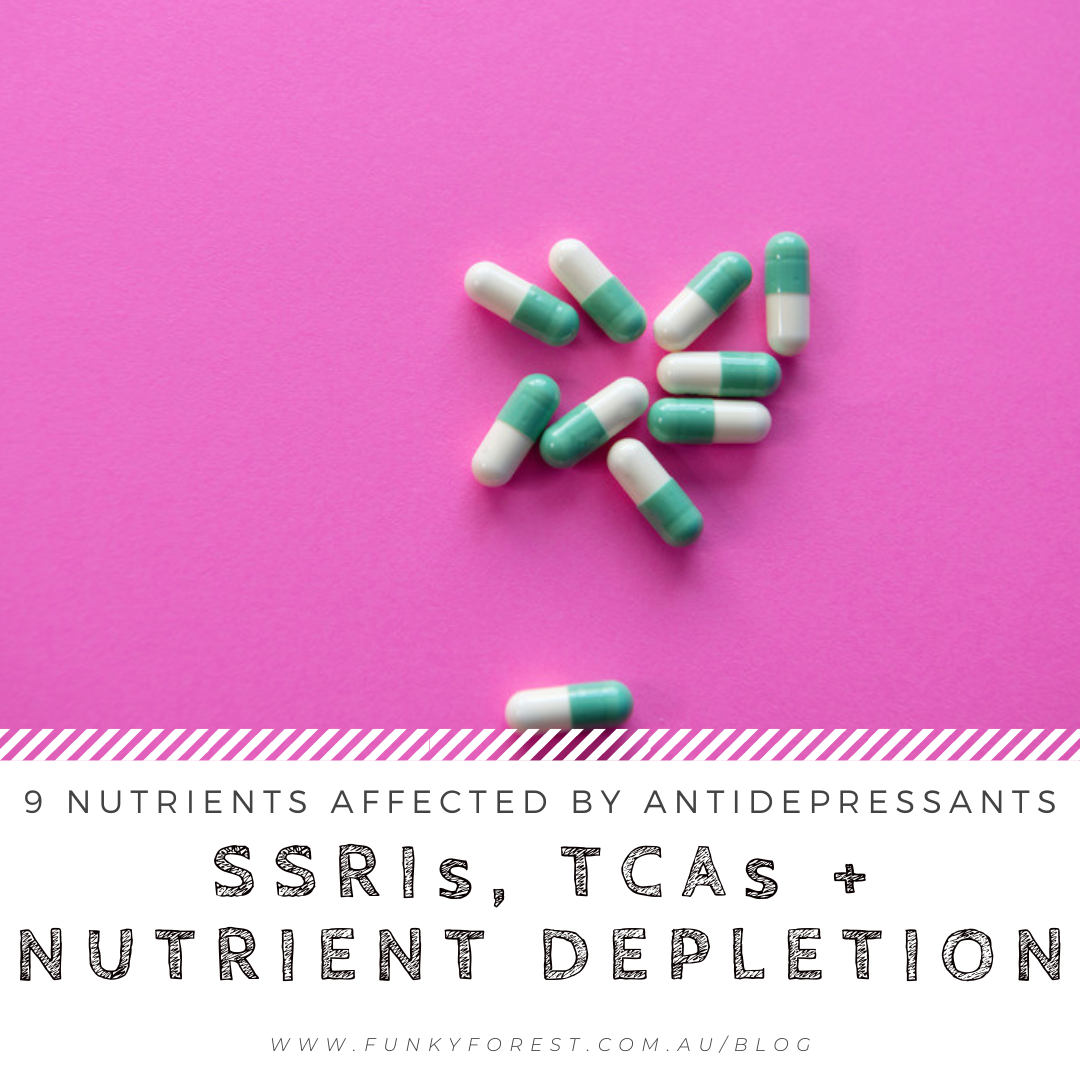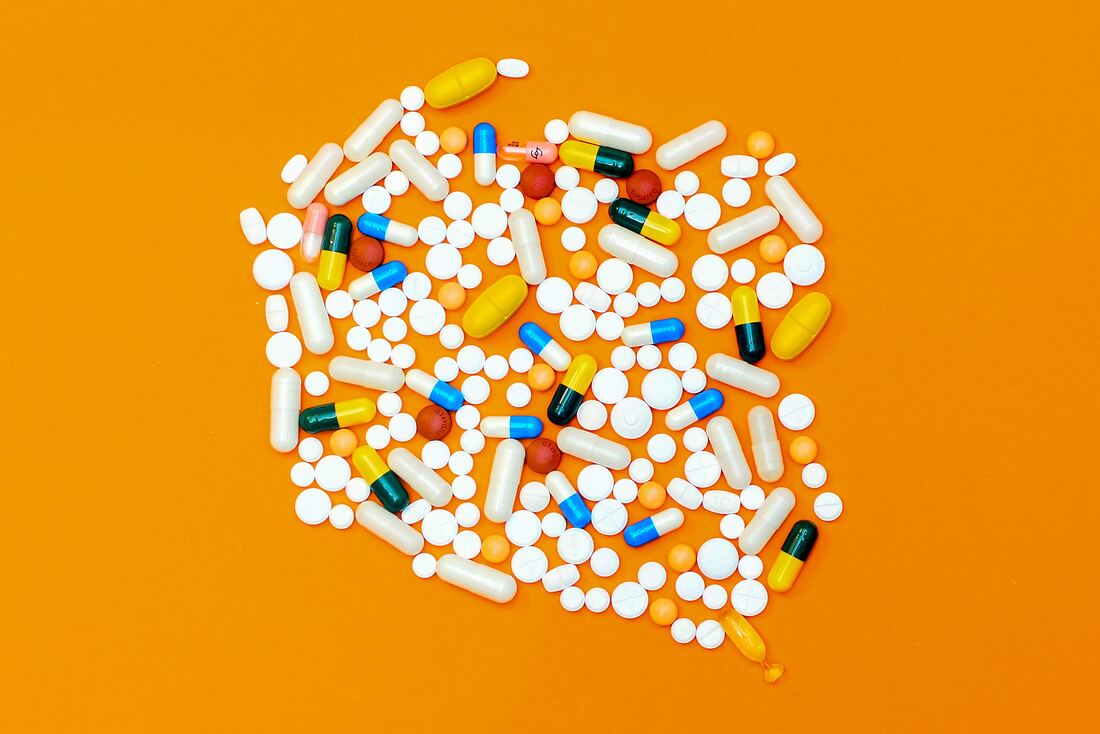Or trauma.
Or inflammation.
(If you're an integrative health practitioner like me, inflammation seems to be the scapegoat for everything these days!)
But depression isn't about any one of these things. Depression is the final common pathway of many biological, psychological, interpersonal and social problems.
Not all depression is the same. There are many different types of depression, many causes of depression, and many reasons why someone might decide to start taking antidepressants.
And many of us have decided to support ourselves this way. With 1 in 8 Australians on antidepressants, these medications continue to be prescribed at an increasing rate, especially among young people (1). In 2018, over 3 million Australians were prescribed an antidepressant, mainly Selective Serotonin Reuptake Inhibitors (SSRIs) for depression or anxiety (2).
As a dietitian and naturopath I work with many clients who have taken these medications for years, yet unfortunately have no idea that the chronic use of certain antidepressants can induce subclinical and clinical micronutrient deficiencies.
Over time (months to years), these deficiencies can cause additional symptoms and increase the side effects of the medication.
What are these side effects? In a 2016 study of 180 long-term users of antidepressants (3–15 years of use), common side effects included:
- withdrawal effects (73.5%)
- sexual problems (71.8%)
- weight gain (65.3%)
- feeling emotionally numb (64.5%)
- feeling addicted (43%)
- feeling moderate-to-severe depression despite being on antidepressants (30%) (3).
To some extent, in some individuals, these side effects will be driven by nutrient deficiencies.
There are two ways that certain vital nutrients and antidepressant medications can form a vicious cycle of deficiency:
1. Nutrient deficiencies can drive depression and anxiety
Interestingly, nutrient deficiencies can be one of the causes of depression and anxiety, two of the most common symptoms these medications are prescribed to treat.
Being deficient in vitamin D, B vitamins (such as B2, B12 and folate) and calcium can make you more prone to depression and anxiety (4). Inadequate levels of these simple, powerful nutrients can be a huge driving factor behind a person's mood disorder. This is why anyone presenting to their health care practitioner with these issues should really be assessed for nutritional deficiencies.
Unfortunately, a thorough nutritional assessment does not always happen.
To add insult to injury, having preexisting low stores of some nutrients (e.g. folate) drastically reduces the efficacy of antidepressants like SSRIs. Nutrient deficiencies can increase the time taken to respond to medication, decrease overall response rate, and increase relapse rate.
2. Antidepressants can further deplete nutrient stores
Antidepressant medications can then further deplete certain vitamins, minerals and hormones from your body. This can lead to more symptoms down the road, such as a return of the depression plus additional side effects like increased anxiety, struggle with focus, and feeling detached emotionally.
Before you accuse me of being a big pharma hating hippie, this article is not a vendetta against these medications. Au contraire. Time and time again I've seen these medications save lives and bring people back from a very deep, dark abyss without which they would have struggled immensely - or simply not made it out.
This article is not a plea for my many wonderful clients and loved ones taking these medications to discontinue their antidepressants. Not only is this out of my scope, but it's a decision that can only be instigated by the person taking the medication and the practitioner (a GP or psychiatrist) who prescribes their medication.
Antidepressant medications have a place and serve an extremely important purpose. I have no doubt about that.
And before any of you hippies accuse me of being a big pharma shill*, I fully support those clients who decide they're dissatisfied with the side effects of antidepressants and wish to reduce their dose or wean off them entirely.
The purpose of this article is to help those taking antidepressants
- to be aware of the potential nutrient deficiencies that can initiate depression and/or come with long term use, and
- to know how to detect, prevent and mitigate these deficiencies in the case that you want or need to keep taking your medication.
Knowledge is power, and in knowing more about this topic you can:
- improve the efficacy and safety of your antidepressant medication/s
- reduce the dose of antidepressants you require for mood stabilisation (always under the supervision of your GP)
- if you choose to, work collaboratively with your GP, psychiatrist and/or nutrition professional (e.g. dietitian, naturopath, nutritionist) to slowly wean off of antidepressants with minimal withdrawal symptoms.
If any of that sounds good to you, or you're a health practitioner who wishes to support those of your clients who are taking antidepressants, I invite you to read on!
What are Antidepressants?
But these medications are also used to treat other conditions, including anxiety disorders and chronic pain. This is why you might have heard of Prozac (the most famous brand name for fluoxetine) being prescribed for severe period pain in conditions like sciatica or premenstrual dysphoric disorder (PMDD).
There are many classes of antidepressant meds, but in this article I will be focusing on just two: Selective Serotonin Reuptake Inhibitors (SSRIs) and Tricyclic Antidepressants (TCAs).
Selective Serotonin Reuptake Inhibitors or SSRIs are the most commonly prescribed class of antidepressants. They work by making serotonin more available in the neural synapse, so instead of being received by the cell and broken down, the serotonin molecule gets to connect with the same receptor several times. The overall effect is an increase of serotonin's feel-good effects.
Examples of SSRIs (and some of their brand names as sold in Australia) are citalopram (Cipramil), escitalopram (Lexapro), fluoxetine (Prozac), fluvoxamine (Luvox), paroxetine (Aropax) and sertraline (Zoloft).
In Australia SSRIs are first line antidepressants, meaning they are often a doctor's first choice for most types of depression.
Tricyclic Antidepressants or TCAs work by inhibiting the reuptake of neurotransmitters such as serotonin and norepinephrine, which can modulate mood, attention, and pain. These medications were initially introduced to the market way back in 1959 as a pharmacotherapy for major depressive disorder (MDD).
Example of TCAs are amitriptyline (Endep, Entrip), clomipramine (Anafranil), dosulepin (Dothep) and doxepin (Sinequan).
Unfortunately, as well as making more serotonin and noradrenaline available, TCAs also change the amounts of histamine and acetylcholine which are involved in other nerve signalling systems that are responsible for a wide range of other bodily processes. Because of this, TCAs cause more significant adverse effects and have a lower threshold for overdose, and are now regarded as second-line treatment options following selective serotonin reuptake inhibitors (SSRIs) (5).
Despite this, a 2022 study investigating antidepressant prescribing patterns in Australia involving nearly 240 000 patients over a 6 year period found that 52% of patients were initially prescribed primarily SSRIs, and 25% were initially prescribed TCAs even though they are not recommended for first-line treatment (6).
This means that like SSRIs, TCAs are still very commonly prescribed, which brings me to the nutrient deficiencies we ought to be aware of when taking these classes of antidepressants.
9 Nutrients to consider when taking SSRI or TCA Antidepressants
Folate (Vitamin B9)
Detection and correction of folate deficiency is a simple but powerful piece of the puzzle for many people experiencing depression.
Not only can repleting folate reduce your risk of depression in the first place, it can also vastly improve your response to antidepressant medications.
So while this nutrient isn't directly depleted by antidepressants per se, we still need to pay attention to it. Why? Because a folate deficiency can cause a lack of response or a delayed response, and a higher chance that even if you do experience any efficacy or success from SSRIs, you will relapse.
In folate replete (adequate levels) versus folate deficient people taking SSRIs, the research results around response to medication are nothing short of staggering:
| Folate Replete Response time: Standard Response rate: 44.7% Relapse rate: 3.2% | Folate Deficient Response time: Delay of up to 1.5 weeks Response rate: 7.1% Relapse rate: 49.2% |
For most people, biologically active forms of folate (such as 5-methyltetrahydrofolate, also known as L-Methylfolate or 5-MTHF) are an effective, safe, and relatively well tolerated nutrient to supplement with. So if you've had only a partial response or no response to SSRIs, this is well worth investigating!
Folate should be given in doses sufficient to decrease plasma homocysteine, keeping in mind that men require a higher dose to achieve this than women (11).
Of course, I encourage folks to increase their folate from food sources, too. For someone with symptoms of depression and pathology showing low levels of serum folate I would prescribe a bioavailable form of folate in the blink of an eye, but food is powerful and there are many wonderful natural sources of folate to include in our diets that many of us simply aren't getting enough of:
- dark green leafy vegetables (spinach, romaine lettuce, asparagus, Brussels sprouts, broccoli, silverbeet, rainbow chard)
- legumes, beans
- peanuts
- sunflower seeds
- fresh fruits and fresh fruit juices
- whole grains
- liver (this is not the last you'll hear of this guy!)
- seafood
- eggs
Numerous studies have reported a significant association between the use of SSRIs and risk of osteoporosis, with considerable evidence indicating that the longer you take an SSRI for and the higher the dose is, the greater your risk of bone fractures. Additional evidence indicates SSRIs may also decrease bone mineral density (BMD) (12).
And this doesn't only happen in the elderly. A systematic review and meta-analysis published in 2018 found an association between risk of bone fracture and the use of SSRIs which was not accounted for by age. It affected all age groups and again, the risk increased with greater duration and dose of antidepressant use (13).
So why does this happen? While the exact mechanism behind the SSRI - lowered BMD link is not fully understood, we do know that osteoblasts, osteoclasts, and osteocytes - the cells that dictate bone building, resorption and remodelling - possess serotonin receptors, which are the same receptor type targeted by SSRIs (12).
The risk of bone fracture in people taking SSRIs is so significant that the authors of a 2012 systematic review encouraged clinicians to "carefully consider bone mineral density screening before prescribing SSRIs" (14). In my clients with restrictive eating disorders (in which BMD is frequently already compromised), SSRIs are often prescribed even in the presence of low BMD.
In a similar fashion to folate, low levels of Vitamin D can also predispose you to depression in the first place. For example, this study showed that a low plasma 25-OH vitamin D3 level is a universal risk factor for a wide range of diseases, including late-life depression (15).
In light of all this, supplementing with calcium and vitamin D may be important for mitigating the decrease in BMD among SSRI users. Supplementation should be pointed and individualised, so I recommend consulting a dietitian, naturopath, or nutritionist to ensure you get the dose right.
We can also consider the natural sources of these crucial bone health nutrients to further insure bone health in the case someone is taking an SSRI long term:
| Vitamin D sources
| Calcium sources
|
Coenzyme Q10
Similarly to folate and vitamin D, if you do not have enough CoQ10, you will be at a higher risk of depressive symptoms, as well as a number of other conditions such as cardiovascular diseases, high blood pressure, cancer, periodontal diseases, mitochondrial disorders, and migraines (16). Symptoms of low CoQ10 include depression, anxiety, high blood pressure, chest pain, memory loss, asthma, chronic fatigue, gum disease, migraines, weakness, and nerve pain.
Certain antidepressants can also directly deplete your body of CoQ10. Tricyclic Antidepressants (TCAs) such as amitriptyline can result in oxidative stress and mitochondrial dysfunction, which in turn results in diminished CoQ10 levels (17). So not only do low levels of CoQ10 predispose you to depression in the first place, but TCAs can further deplete your CoQ10 stores which worsens the depression these medications are intended to alleviate.
It's a bit average, I know.
How would you know if you are low in CoQ10? Blood tests can give some indication, although blood levels may not be reflective of the amount of CoQ10 in tissues and cells. When testing it's important that your practitioner notes the ratio of ubiquinol to ubiquinone when assessing the extent of oxidative stress (18). In addition to testing, a common symptom of mild deficiency is physical fatigue and muscle weakness even while undertaking relatively non-strenuous physical activities such as walking.
Research suggests Q10 supplementation to counteract the adverse effects of amitriptyline (19). However, please check with your health practitioner before self-prescribing supplements as there are numerous forms of CoQ10 and your practitioner will be able to direct you to the form and dose best suited to your situation.
This is one of the more expensive supplements so you really want to make sure it's indicated before rushing out to spend money on supplements indiscriminately. And of course, please consider the dietary sources of this crucial antioxidant.
Dietary sources of CoQ10 include:
- Organ meats: kidney, liver, heart. Check out the liver pâté recipe that changed my stance on liver here!
- Oily fish: sardines, salmon, tuna, trout, mackerel
- Meats: chicken, beef, pork
- Vegetables: spinach, broccoli, cauliflower
- Fruits: strawberries, oranges
- Legumes: soybeans, lentils, peanuts.
- Nuts and seeds: pistachio, sesame seeds
A growing body of research indicates that there is a role for B vitamins in depression, since low B vitamin status in people with depression can reduce response to antidepressants (20). According to the research available at the time of writing, when it comes to antidepressant use the B vitamins in question are B2, and to a lesser extent B3, B6 and B12.
Vitamin B2 (Riboflavin)
Riboflavin, or vitamin B2, is used by the body to metabolise carbohydrates, fats, and protein into glucose for energy. In addition to supporting energy production this vitamin functions as an antioxidant that supports the proper functioning of the immune system, as well as healthy skin and hair.
Certain TCAs (such as chlorpromazine, imipramine, and amitriptyline) interfere with riboflavin metabolism partly by inhibiting the conversion of riboflavin to its coenzyme derivatives. The result? Overall utilisation of riboflavin is impaired (21).
And since B vitamin status in patients with depression can negatively impact on antidepressant response, we see - yet again - the vicious cycle of a depression-inducing nutrient deficiency being amplified by the very medication prescribed to treat the depressive symptoms, worsening the problem.
Vitamin B2 (Riboflavin) is found in foods such as beef liver (I know, I know), lamb, mushrooms, spinach and almonds.
Vitamin B3 (Niacin)
Niacin is important for the maintenance of cellular integrity and energy production and is involved in hundreds of intracellular reactions. It forms the major dietary precursors for two important coenzymes, nicotinamide adenine dinucleotide (NAD) and its phosphorylated form, NADP. Anyone who studied first year biochemistry at uni is probably familiar with the citric acid cycle (Krebs' or TCA cycle) and might recognise these acronyms, even if (like me) you didn't quite remember what they stand for!
Speaking of cycles, here we see another case of that old vicious cycle: a niacin deficiency may increase your risk of developing depression, AND taking certain antidepressants may lead to a niacin deficiency (22) - are you seeing a pattern emerge here?
Many antidepressants inhibit the activity of the enzyme indoleamine 2,3-dioxygenase (IDO), which is required for the de novo synthesis of niacin. And since niacin is involved in so many intracellular reactions, a deficiency often contributes to neuropsychiatric and neurodegenerative disorders, for which antidepressants are often prescribed.
The kicker is that a niacin deficiency - like a folate deficiency - can make it difficult to assess the efficacy of antidepressants. This may prompt your prescribing practitioner to increase your dose unnecessarily.
Foods that provide niacin include:
- red meat: beef, beef liver (this is just getting ridiculous now), pork
- poultry
- fish
- brown rice
- fortified cereals and breads
- nuts and seeds
- legumes
- bananas
Brace yourself for the old vicious cycle of low nutrient stores being further depleted by antidepressant use again! I know it sounds dire, but consider the flip side of this situation: when individuals are nutrient replete before commencing antidepressants, the medication can be more effective, for longer. Plus they may be less likely to experience depressive symptoms in the first place.
Low vitamin B6 status has been linked to depressive symptoms, and this appears to persist over time (23). A more uplifting 2020 review concluded that supplementation of Vitamin B12 early enough can delay the onset of depression and improve the effect of antidepressants when the two are used in conjunction (24).
There are also studies showing benefits when combining multiple B vitamins together, albeit with weaker results. A year-long RCT investigating the impact of Vitamin B6, B12 and folic acid supplementation on patients taking citalopram (an SSRI) found that although these B vitamins did not increase the short term 12-week efficacy of antidepressant treatment, they did enhance and sustain antidepressant response over one year (25).
Another study found that supplementing vitamin B12 and folic acid may improve health-related quality of life (HR-QoL) in older adults due to the homocysteine-lowering effect of these B vitamins, even though supplementation did not directly reduce depressive symptoms (26).
These findings suggest that the adjunctive use of B vitamins may be a safe and inexpensive way to manage depression in adults. Supplements can of course be helpful, but don't forget your food sources of B vitamins such as:
- fish
- liver :) and other organ meats
- eggs
- milk and yoghurt (dairy)
- beef, pork and poultry
- oysters, clams and mussels
- legumes
- sunflower seeds
- leafy greens
- fortified foods, such as cereal, nutritional and Brewer's yeast
- mushrooms
Since you're probably sick of hearing about liver's accolades, mushrooms are a great vegetarian source of many B vitamins. One serve of mushrooms (100g or three button mushrooms) contains 1/3 of your daily needs of riboflavin (B2) and biotin (B7), 1/4 of your daily needs of niacin (B3) and pantothenic acid (B5), and modest amounts of folate and vitamin B12 (27). Phew!
The production and release of melatonin is connected to time of day, increasing when it's dark and decreasing when it's light. Melatonin works in a see-saw fashion with serotonin: when one goes up, the other goes down. Ideally, serotonin increases with daylight, at which time melatonin decreases.
What does melatonin have to do with depression? Think about your mood when you have gone to bed too late, slept poorly, and/or worked night shifts. Your mood suffers because disrupted circadian rhythms can lead to depressive symptoms. I think back to two straight weeks of night shift I worked as a veterinary intern - I've never felt more emotionally unhinged, or more like I was going to die. This is one of the main reasons I moved away from working as a vet! (Love you guys, you are true under-appreciated legends).
Here's where melatonin shines: it induces antidepressant effects via promoting neurogenesis, and by suppressing oxidative stress, neuroinflammation, and apoptosis. Basically you need adequate melatonin to regulate your circadian rhythm and keep your nervous system happy.
Research has shown that antidepressant medications like the SSRI fluoxetine (better known as Prozac) deplete the body of melatonin. This may be due to the pharmacological action of SSRIs on melatonin secretion.
In short, SSRIs can increase daytime melatonin synthesis, which may mean less melatonin is available at night when we really want more of it for sleep support. It can also mean we feel more drowsy during the day (28). This may be in part why people often experience sleeping difficulties while taking these medications.
The good news? Melatonin supplements can reduce the unwanted side effects of desipramine and fluoxetine (29). The mechanism of this effect was shown in another study showing how melatonin protects against lipopolysaccharide (LPS)-induced neuroinflammation, which has long been linked to depression (30). Note that these were both animal studies and more research is needed, but it goes without saying that melatonin and the circadian rhythm are important factors to consider in the pathogenesis of depressive symptoms.
So how can we ensure our melatonin production and release is healthy?
- Food. Although your body makes it naturally, melatonin is found in some foods such as pistachios, tart cherries, and mushrooms.
- Supplementation. No surprises here, you can also take melatonin as a supplement.
- Sleep hygiene. I don't need to lecture you on the importance of getting to bed in a timely manner, ceasing screens emitting blue light 2+ hours before bed, and all that jazz, do I?! Oh well, I just did.
- Increasing daylight exposure. See below.
To end on a fun note, camping can help reset your body clock. A 2013 study found that after one week away camping, volunteers were exposed to four times more daylight than usual, syncing their body clocks back in line with the summer sun. Their release of melatonin came on near sunset - two hours earlier than usual - and naturally began to wane around dawn. This increased both their quality of night time sleep and daytime wakefulness (31). As a lover of the outdoors this is all the motivation I need to set out with backpack in tow.
In closing, antidepressants are both potentially life-saving medications, and when taken long term they have side effects that may reduce quality of life. It is my hope that in sharing research on the potential nutrient deficiencies that can both initiate depression and come with long term use of SSRIs and TCAs, and knowing how you can mitigate these deficiencies helps you to experience much better efficacy and safety of your antidepressant medication/s.
And if you choose to reduce the dose of antidepressants you require for mood stabilisation (always under the supervision of your GP) or even completely come off your medication**, being nutritionally replete can help to minimise withdrawal symptoms and may even ensure that once you're off the meds, you never need them again.
If you're looking for support with mood, cognitive function, or other mental health concerns, I would love to help in any way I can. You can contact me on [email protected] or make a booking to see me 1:1, here.
Wishing you a healthy and peaceful mind,
Casey
* If only! Also, if I were a big pharma shill I would be, like, rich.
** Please remember, never stop antidepressants suddenly - ask your doctor how to taper (gradually reduce) your dose to minimise withdrawal symptoms.
References
- de Oliveira Costa, J., Gillies, M. B., Schaffer, A. L., Peiris, D., Zoega, H., & Pearson, S. A. (2023). Changes in antidepressant use in Australia: A nationwide analysis (2015-2021). The Australian and New Zealand journal of psychiatry, 57(1), 49–57. https://doi.org/10.1177/00048674221079740
- https://www.psychwatchaustralia.com/post/1-in-8-over-3-million-australians-are-on-antidepressants-why-is-the-lucky-country-so-miserable
- Cartwright, C., Gibson, K., Read, J., Cowan, O., & Dehar, T. (2016). Long-term antidepressant use: patient perspectives of benefits and adverse effects. Patient preference and adherence, 10, 1401–1407. https://doi.org/10.2147/PPA.S110632
- Malhi, G. S., Bassett, D., Boyce, P., Bryant, R., Fitzgerald, P. B., Fritz, K., Hopwood, M., Lyndon, B., Mulder, R., Murray, G., Porter, R., & Singh, A. B. (2015). Royal Australian and New Zealand College of Psychiatrists clinical practice guidelines for mood disorders. The Australian and New Zealand journal of psychiatry, 49(12), 1087–1206. https://doi.org/10.1177/0004867415617657
- Moraczewski J, Awosika AO, Aedma KK. Tricyclic Antidepressants. [Updated 2023 Aug 17]. In: StatPearls [Internet]. Treasure Island (FL): StatPearls Publishing; 2023 Jan-. Available from: https://www.ncbi.nlm.nih.gov/books/NBK557791/
- Malhi, G. S., Acar, M., Kouhkamari, M. H., Chien, T. H., Juneja, P., Siva, S., & Baune, B. T. (2022). Antidepressant prescribing patterns in Australia. BJPsych open, 8(4), e120. https://doi.org/10.1192/bjo.2022.522
- Alpert, M., Silva, R. R., & Pouget, E. R. (2003). Prediction of treatment response in geriatric depression from baseline folate level: interaction with an SSRI or a tricyclic antidepressant. Journal of clinical psychopharmacology, 23(3), 309–313. https://doi.org/10.1097/01.jcp.0000084024.22282.cd
- Papakostas, G. I., Petersen, T., Mischoulon, D., Ryan, J. L., Nierenberg, A. A., Bottiglieri, T., Rosenbaum, J. F., Alpert, J. E., & Fava, M. (2004). Serum folate, vitamin B12, and homocysteine in major depressive disorder, Part 1: predictors of clinical response in fluoxetine-resistant depression. The Journal of clinical psychiatry, 65(8), 1090–1095. https://doi.org/10.4088/jcp.v65n0810
- Papakostas, G. I., Petersen, T., Lebowitz, B. D., Mischoulon, D., Ryan, J. L., Nierenberg, A. A., Bottiglieri, T., Alpert, J. E., Rosenbaum, J. F., & Fava, M. (2005). The relationship between serum folate, vitamin B12, and homocysteine levels in major depressive disorder and the timing of improvement with fluoxetine. The international journal of neuropsychopharmacology, 8(4), 523–528. https://doi.org/10.1017/S1461145705005195
- Fava, M., Borus, J. S., Alpert, J. E., Nierenberg, A. A., Rosenbaum, J. F., & Bottiglieri, T. (1997). Folate, vitamin B12, and homocysteine in major depressive disorder. The American journal of psychiatry, 154(3), 426–428. https://doi.org/10.1176/ajp.154.3.426
- Coppen, A., & Bailey, J. (2000). Enhancement of the antidepressant action of fluoxetine by folic acid: a randomised, placebo controlled trial. Journal of affective disorders, 60(2), 121–130. https://doi.org/10.1016/s0165-0327(00)00153-1
- Mohn, E. S., Kern, H. J., Saltzman, E., Mitmesser, S. H., & McKay, D. L. (2018). Evidence of Drug-Nutrient Interactions with Chronic Use of Commonly Prescribed Medications: An Update. Pharmaceutics, 10(1), 36. https://doi.org/10.3390/pharmaceutics10010036
- Khanassov, V., Hu, J., Reeves, D., & van Marwijk, H. (2018). Selective serotonin reuptake inhibitor and selective serotonin and norepinephrine reuptake inhibitor use and risk of fractures in adults: A systematic review and meta-analysis. International journal of geriatric psychiatry, 33(12), 1688–1708. https://doi.org/10.1002/gps.4974
- Eom, C. S., Lee, H. K., Ye, S., Park, S. M., & Cho, K. H. (2012). Use of selective serotonin reuptake inhibitors and risk of fracture: a systematic review and meta-analysis. Journal of bone and mineral research : the official journal of the American Society for Bone and Mineral Research, 27(5), 1186–1195. https://doi.org/10.1002/jbmr.1554
- Oude Voshaar, R. C., Derks, W. J., Comijs, H. C., Schoevers, R. A., de Borst, M. H., & Marijnissen, R. M. (2014). Antidepressants differentially related to 1,25-(OH)₂ vitamin D₃ and 25-(OH) vitamin D₃ in late-life depression. Translational psychiatry, 4(4), e383. https://doi.org/10.1038/tp.2014.14
- Saini R. (2011). Coenzyme Q10: The essential nutrient. Journal of pharmacy & bioallied sciences, 3(3), 466–467. https://doi.org/10.4103/0975-7406.84471
- Cordero, M. D., Moreno-Fernández, A. M., Gomez-Skarmeta, J. L., de Miguel, M., Garrido-Maraver, J., Oropesa-Avila, M., Rodríguez-Hernández, A., Navas, P., & Sánchez-Alcázar, J. A. (2009). Coenzyme Q10 and alpha-tocopherol protect against amitriptyline toxicity. Toxicology and applied pharmacology, 235(3), 329–337. https://doi.org/10.1016/j.taap.2008.12.026
- Yamamoto, Y., & Yamashita, S. (1997). Plasma ratio of ubiquinol and ubiquinone as a marker of oxidative stress. Molecular aspects of medicine, 18 Suppl, S79–S84. https://doi.org/10.1016/s0098-2997(97)00007-1
- Moreno-Fernández, A. M., Cordero, M. D., Garrido-Maraver, J., Alcocer-Gómez, E., Casas-Barquero, N., Carmona-López, M. I., Sánchez-Alcázar, J. A., & de Miguel, M. (2012). Oral treatment with amitriptyline induces coenzyme Q deficiency and oxidative stress in psychiatric patients. Journal of psychiatric research, 46(3), 341–345. https://doi.org/10.1016/j.jpsychires.2011.11.002
- Ryan, K. M., Allers, K. A., Harkin, A., & McLoughlin, D. M. (2020). Blood plasma B vitamins in depression and the therapeutic response to electroconvulsive therapy. Brain, behavior, & immunity - health, 4, 100063. https://doi.org/10.1016/j.bbih.2020.100063
- Pinto, J., Huang, Y. P., & Rivlin, R. S. (1981). Inhibition of riboflavin metabolism in rat tissues by chlorpromazine, imipramine, and amitriptyline. The Journal of clinical investigation, 67(5), 1500–1506. https://doi.org/10.1172/jci110180
- Viljoen, M., Swanepoel, A., & Bipath, P. (2015). Antidepressants may lead to a decrease in niacin and NAD in patients with poor dietary intake. Medical hypotheses, 84(3), 178–182. https://doi.org/10.1016/j.mehy.2014.12.017
- Arévalo, S. P., Scott, T. M., Falcón, L. M., & Tucker, K. L. (2019). Vitamin B-6 and depressive symptomatology, over time, in older Latino adults. Nutritional neuroscience, 22(9), 625–636. https://doi.org/10.1080/1028415X.2017.1422904
- Sangle, P., Sandhu, O., Aftab, Z., Anthony, A. T., & Khan, S. (2020). Vitamin B12 Supplementation: Preventing Onset and Improving Prognosis of Depression. Cureus, 12(10), e11169. https://doi.org/10.7759/cureus.11169
- Almeida, O. P., Ford, A. H., Hirani, V., Singh, V., vanBockxmeer, F. M., McCaul, K., & Flicker, L. (2014). B vitamins to enhance treatment response to antidepressants in middle-aged and older adults: results from the B-VITAGE randomised, double-blind, placebo-controlled trial. The British journal of psychiatry : the journal of mental science, 205(6), 450–457. https://doi.org/10.1192/bjp.bp.114.145177
- de Koning, E. J., van der Zwaluw, N. L., van Wijngaarden, J. P., Sohl, E., Brouwer-Brolsma, E. M., van Marwijk, H. W., Enneman, A. W., Swart, K. M., van Dijk, S. C., Ham, A. C., van der Velde, N., Uitterlinden, A. G., Penninx, B. W., Elders, P. J., Lips, P., Dhonukshe-Rutten, R. A., van Schoor, N. M., & de Groot, L. C. (2016). Effects of Two-Year Vitamin B12 and Folic Acid Supplementation on Depressive Symptoms and Quality of Life in Older Adults with Elevated Homocysteine Concentrations: Additional Results from the B-PROOF Study, an RCT. Nutrients, 8(11), 748. https://doi.org/10.3390/nu8110748
- Koyyalamudi, S., Jeong, S. C., Satyanarayanan, M., Balaram, V., & Pang, G. (2013). Micronutrient mineral content of the fruiting bodies of Australian cultivated Agaricus bisporus white button mushrooms. Journal of Food Composition and Analysis. 31. 109-114. 10.1016/j.jfca.2013.03.007.
- Reierson, G. W., Mastronardi, C. A., Licinio, J., & Wong, M. L. (2009). Chronic fluoxetine treatment increases daytime melatonin synthesis in the rodent. Clinical pharmacology : advances and applications, 1, 1–6. https://doi.org/10.2147/CPAA.S7157
- Carvalho, L. A., Gorenstein, C., Moreno, R., Pariante, C., & Markus, R. P. (2009). Effect of antidepressants on melatonin metabolite in depressed patients. Journal of psychopharmacology (Oxford, England), 23(3), 315–321. https://doi.org/10.1177/0269881108089871
- Ali, T., Hao, Q., Ullah, N., Rahman, S. U., Shah, F. A., He, K., Zheng, C., Li, W., Murtaza, I., Li, Y., Jiang, Y., Tan, Z., & Li, S. (2020). Melatonin Act as an Antidepressant via Attenuation of Neuroinflammation by Targeting Sirt1/Nrf2/HO-1 Signaling. Frontiers in molecular neuroscience, 13, 96. https://doi.org/10.3389/fnmol.2020.00096
- Stothard, E. R., McHill, A. W., Depner, C. M, Birks, B. R., Moehlman, T. M., Ritchie, H. K., Guzzetti, J. R., Chinoy, E. D., LeBourgeois, M. K., Axelsson, J., Wright, K. P. Jr. (2017). Circadian entrainment to the natural light-dark cycle across seasons and the weekend. Current Biology, 27(4), 508-513. https://doi.org/10.1016/j.cub.2016.12.041









































 RSS Feed
RSS Feed



